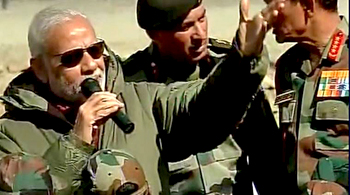Kinnaur (HP), Oct 30: The first installment of nearly Rs 5,500 crore has been paid for implementing the OROP scheme, Prime Minister Narendra Modi today said while asserting that he has "fulfilled the promise" he made to ex-servicemen on the issue that has been hanging fire for the last 40 years.
 The Prime Minister, while celebrating Diwali with army and ITBP personnel in Sumdo here, over 270 km from state capital Shimla, also lauded the role of the security force personnel guarding and protecting the country.
The Prime Minister, while celebrating Diwali with army and ITBP personnel in Sumdo here, over 270 km from state capital Shimla, also lauded the role of the security force personnel guarding and protecting the country.
"Spent time with our courageous @ITBP_official & Army Jawans at Sumdo, Kinnaur district, Himachal Pradesh. Jai Jawan! Jai Hind!," he tweeted.
Earlier in his 'Mann ki Baat' programme on All India Radio, he saluted the valour of the armed forces and lauded their sacrifice while dedicating the festival of Diwali to them.
"The OROP was not about just Rs 200 or Rs 500 crore, but Rs 10,000 crore... After I became the PM, and decided that I had to do (implement) it, the entire government lost sleep over it... It was not possible for the government to pay in one go, so I requested the ex-servicemen to accept it in four instalments.
"The money will reach them in four installments. Nearly, Rs 5,500 crore has been paid as the first installment," Modi said.
He said the issue had been pending for "40 years" as certain people in the previous governments "did not know" about OROP (scheme), and therefore "only Rs 500 crore was allocated" for the purpose.
Modi also said that many people thought that if the scheme was not implemented, a section of "ex-servicemen would turn against the government".
The Prime Minister, on his way to Sumdo, met civilians at Himachal's Chango village, close to the Sino-Indian border.
"Made unscheduled stop at Chango village, close to Somdu, to wish people on Diwali. Was deeply touched by the impromptu reception & their joy," Modi tweeted.
"The Prime Minister spent time with ITBP jawans and personnel of Dogra Scouts of army at Sumdo on border of Kinnaur and Spiti, and distributed sweets to them," an official said.
Modi also met personnel of the General Reserve Engineering Force (GREF), a branch of Border Roads Organisation (BRO), entrusted with construction and maintenance of border roads and also executing the Rohtang Tunnel project, the official said.
After coming in power in 2014, the Prime Minister had celebrated his first Diwali with soldiers posted in Siachen, and in 2015, he celebrated it at the India-Pakistan border in Punjab.






Comments
Add new comment